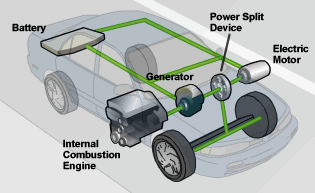Hybrids Approach Parity

John Gartner reports in today's "Autopia" blog on Wired that hybrids could become a good buy for consumers in the next two years, thanks to innovations in lithium ion batteries. These batteries are 35 percent lighter and 55 percent smaller than nickel metal hydride batteries, and enable vehicle manufacturers to cut the price delta by half. Granted, this post was prompted by a bit of shilling on the part of Charles Gassenheimer, the Vice Chairman of Ener1 Inc., which develops lithium ion batteries.
Even still, this topic has been of immense interest to me and anyone else who'd like to see consumers, the economy and the environment all get out from under the thumb of Big Oil. In business school, we spent a lot of time on cases involving alternative energy startups and the product roadmap for hybrid and other low-consumption vehicles. While many of us argued the point that we'd rather pay a premium to Toyota or Honda than to Exxon, ultimately, we came back to the sad conclusion that consumers will always vote with their wallets.
After grinding a few of the data points in Gartner's post, I've found there's reason to be more optimistic. Currently, car buyers pay a $4,000 premium for a hybrid car over the equivalent gas car. Assuming the average motorist drives 12,000 miles a year and pays the current average fuel cost of $2.581 a gallon, it would take nearly six and a half years for the fuel savings to catch up with the premium one pays for a hybrid car. Given that most people sell their cars after five years, there's not a strong financial value proposition for hybrid cars currently. These are my calcs:
| Hybrid | Regular |
Mileage | 50 | 25 |
Premium | $4,000.00 | $0.00 |
Miles/Year | 12,000 | 12,000 |
Gallons purchased | 240 | 480 |
Fuel cost | $2.58 | $2.58 |
Annual fuel cost | $619.44 | $1,238.88 |
Years to break even | 6.46 | 6.46 |
Total Fuel Cost + Premium | $8,000.00 | $8,000.00 |
But, if Gassenheimer's prediction holds true, hybrid car buyers would need less than three years and three months to break even. That's well within the five-year window in which most people keep new cars and thus shows a very reasonable financial value prop. Of course, true finance geeks will haggle about time value of money, but since you'd have to apply that to both the up-front cost of a hybrid and the added fuel costs of a gas car, I think it comes close to being a wash.
| Hybrid | Regular |
Mileage | 50 | 25 |
Premium | $2,000.00 | $0.00 |
Miles/Year | 12,000 | 12,000 |
Gallons purchased | 240 | 480 |
Fuel cost | $2.58 | $2.58 |
Annual fuel cost | $619.44 | $1,238.88 |
Years to break even | 3.23 | 3.23 |
Total Fuel Cost + Premium | $4,000.00 | $4,000.00 |
Labels: business, technology








0 Comments:
Post a Comment
<< Home